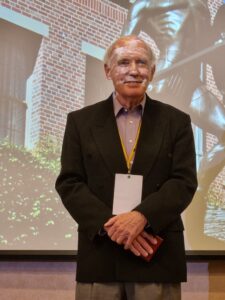

The highest recognition from the Society for the History of Technology is the Leonardo da Vinci Medal, presented to an individual who has made an outstanding contribution to the history of technology, through research, teaching, publication, and other activities.

2023 Da Vinci Medalist Alex Roland (Photo: SHOT)
Dr. Alex Roland is awarded the 2023 Leonardo da Vinci Medal for his scholarly contributions to the history of technology, his service to SHOT, his dedication and influence as an educator, and his role as public-facing expert on military and aerospace history.
Roland’s historical questions initially grew out of his experiences as a military officer during the Vietnam era. After graduating from the U.S. Naval Academy, Roland served in the U.S. Marine Corps, part of the time as an aide to a front-line surgeon in Vietnam. He received an MA from the University of Hawaii in 1970, after which he enrolled in the doctoral program at Duke University. After several years as a staff member in the NASA History Office, Roland joined the History Department faculty at Duke University. He has also held appointments at both the U.S. Army War College and the U.S. Naval Academy.
Beginning with the publication of Underwater Warfare in the Age of Sail (1978) Roland’s many books and articles have demonstrated his wide-ranging interest. His corpus of work covers centuries, continents, oceans, and even the reaches of outer space in pursuit of understanding the interrelationship between technology and society. His scholarly books include Model Research: The National Advisory Committee for Aeronautics, 1915- 1958 (1985), Strategic Computing: DARPA and the Quest for Machine Intelligence, 1983- 1993 (2002, with Phillip Shiman). His most recent publication, Delta of Power: The Military Industrial Complex (2021) has been described by Prize winning historian Walter A. McDougall as a “synthetic masterpiece” written by a “brilliant historian.”
Alex Roland has contributed intellectually and organizationally to SHOT through many decades. Following a term on the Executive Council, Alex served for four years as SHOT Secretary before becoming president in 1995. His presidency was a time of great activity, including a change in the editorship of T&C and notable accomplishments in the realm of fundraising, including the inauguration of several SHOT prizes and awards.
Roland’s presidential address in London, “What Hath Kranzberg Wrought? Or, Does the History of Technology Matter?” left us with the suggestion that “We must step back from our own shared understanding that technology matters and produce scholarship to convince the unbelievers that technology matters.” Alex Roland has practiced what he preached in that address. For many years Roland was a frequent presence on “The PBS News Hour,” and he continues to publish opinion pieces in such newspapers as the Orlando Sentinel, the Pittsburgh Press- Gazette, and the Wall Street Journal and to speak about history to a wide range of audiences.
In addition to his scholarly writing, Roland has also published several books intended for general readers and university students. As their titles often make clear, these books use the same analytic framework as his scholarly writing: Men in Arms: A History of Warfare and Interrelationships with Western Society (1991; with Richard Preston and Sydney Wise); The Way of the Ship: America’s Maritime History Reenvisioned (2007; with W. Jeffrey Bolster and Alexander Keyssar) and War and Technology: A Very Short Introduction (2016).
Amidst all this other activity, Roland has also dedicated himself to maintaining the highest standards of teaching. Duke but also UNC-Chapel Hill, all around the Research Triangle area – and, it sometimes seems, across all the branches of military service, from the Air War College to the Naval Academy. Former students report that he has patiently mentored both undergraduate and graduate students with rigorous, serious engagement with their work and their goals. It is a mark of his intellectual generosity, that his former students have gone on to distinguished careers not only in military history, but also as far ranging as women and gender studies and agricultural history.
For these reasons we believe that Alex Roland—fifty years after his first engagement with SHOT—is a worthy candidate for the society’s highest honor.